Criminology: Definitions, Tasks, Questions, and Challenging Norms
VerifiedAdded on 2023/05/30
|15
|4078
|56
Essay
AI Summary
This essay provides a comprehensive overview of criminology, starting with its definition according to various scholars and exploring its core tasks, such as reforming criminals, understanding the mindset of criminals and victims, and researching crime trends. It delves into the key questions that criminology seeks to answer, including measuring crime, evaluating preventive measures, and assessing the impact of prisons. The essay also discusses how criminology challenges common-sense understandings of crime by examining crime as a social construct and questioning the definition of criminal acts. Finally, it touches upon the roles of a criminologist in studying the causes and consequences of crime.
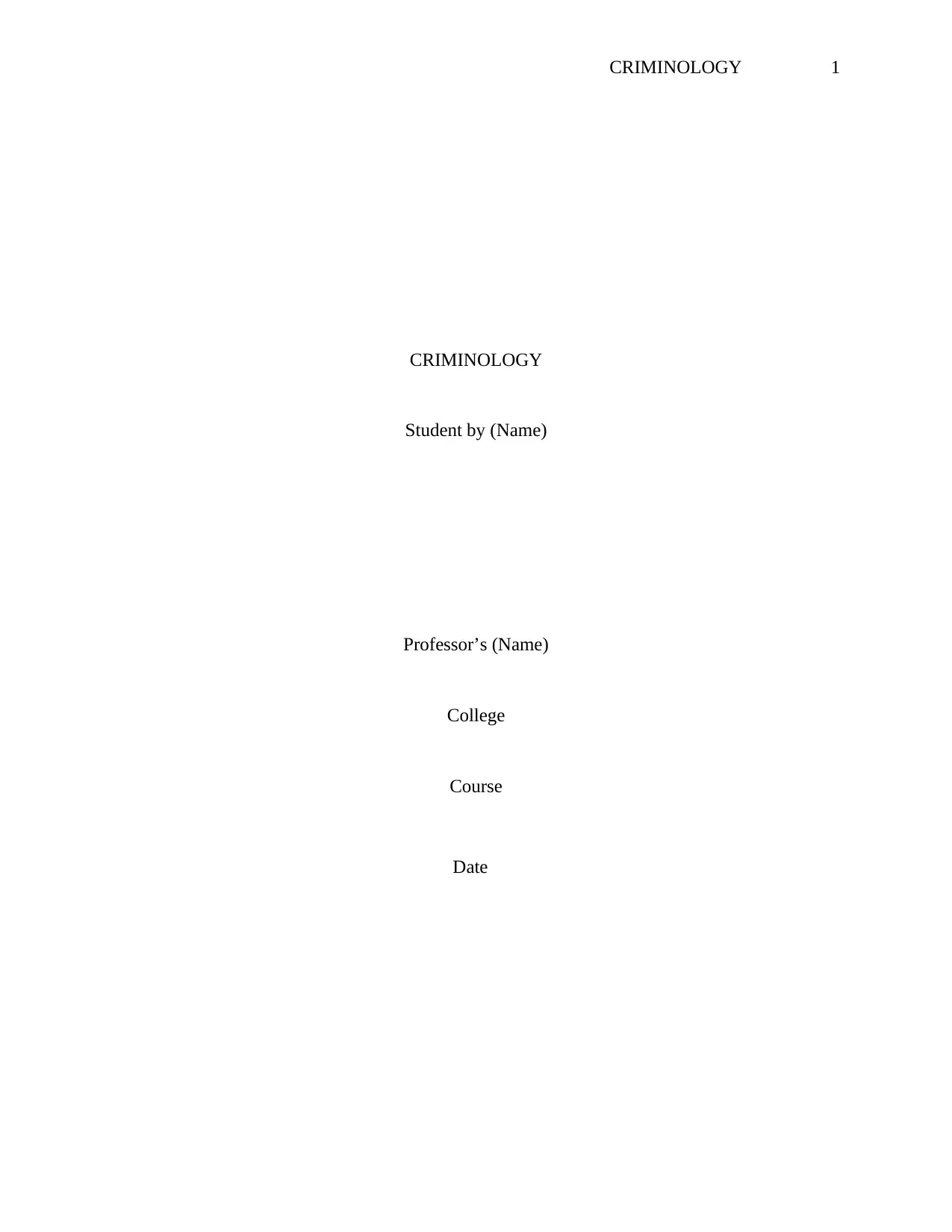
CRIMINOLOGY 1
CRIMINOLOGY
Student by (Name)
Professor’s (Name)
College
Course
Date
CRIMINOLOGY
Student by (Name)
Professor’s (Name)
College
Course
Date
Paraphrase This Document
Need a fresh take? Get an instant paraphrase of this document with our AI Paraphraser
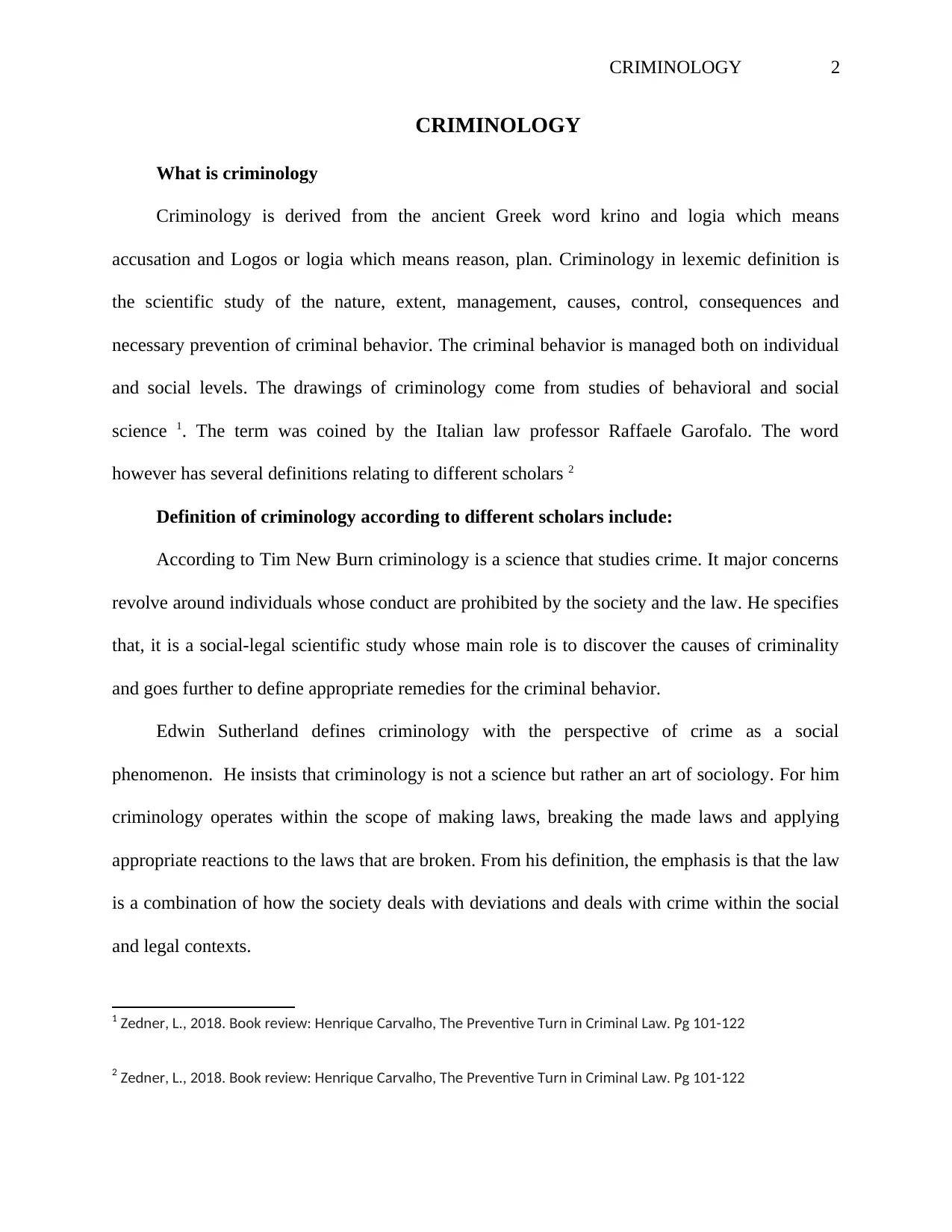
CRIMINOLOGY 2
CRIMINOLOGY
What is criminology
Criminology is derived from the ancient Greek word krino and logia which means
accusation and Logos or logia which means reason, plan. Criminology in lexemic definition is
the scientific study of the nature, extent, management, causes, control, consequences and
necessary prevention of criminal behavior. The criminal behavior is managed both on individual
and social levels. The drawings of criminology come from studies of behavioral and social
science 1. The term was coined by the Italian law professor Raffaele Garofalo. The word
however has several definitions relating to different scholars 2
Definition of criminology according to different scholars include:
According to Tim New Burn criminology is a science that studies crime. It major concerns
revolve around individuals whose conduct are prohibited by the society and the law. He specifies
that, it is a social-legal scientific study whose main role is to discover the causes of criminality
and goes further to define appropriate remedies for the criminal behavior.
Edwin Sutherland defines criminology with the perspective of crime as a social
phenomenon. He insists that criminology is not a science but rather an art of sociology. For him
criminology operates within the scope of making laws, breaking the made laws and applying
appropriate reactions to the laws that are broken. From his definition, the emphasis is that the law
is a combination of how the society deals with deviations and deals with crime within the social
and legal contexts.
1 Zedner, L., 2018. Book review: Henrique Carvalho, The Preventive Turn in Criminal Law. Pg 101-122
2 Zedner, L., 2018. Book review: Henrique Carvalho, The Preventive Turn in Criminal Law. Pg 101-122
CRIMINOLOGY
What is criminology
Criminology is derived from the ancient Greek word krino and logia which means
accusation and Logos or logia which means reason, plan. Criminology in lexemic definition is
the scientific study of the nature, extent, management, causes, control, consequences and
necessary prevention of criminal behavior. The criminal behavior is managed both on individual
and social levels. The drawings of criminology come from studies of behavioral and social
science 1. The term was coined by the Italian law professor Raffaele Garofalo. The word
however has several definitions relating to different scholars 2
Definition of criminology according to different scholars include:
According to Tim New Burn criminology is a science that studies crime. It major concerns
revolve around individuals whose conduct are prohibited by the society and the law. He specifies
that, it is a social-legal scientific study whose main role is to discover the causes of criminality
and goes further to define appropriate remedies for the criminal behavior.
Edwin Sutherland defines criminology with the perspective of crime as a social
phenomenon. He insists that criminology is not a science but rather an art of sociology. For him
criminology operates within the scope of making laws, breaking the made laws and applying
appropriate reactions to the laws that are broken. From his definition, the emphasis is that the law
is a combination of how the society deals with deviations and deals with crime within the social
and legal contexts.
1 Zedner, L., 2018. Book review: Henrique Carvalho, The Preventive Turn in Criminal Law. Pg 101-122
2 Zedner, L., 2018. Book review: Henrique Carvalho, The Preventive Turn in Criminal Law. Pg 101-122
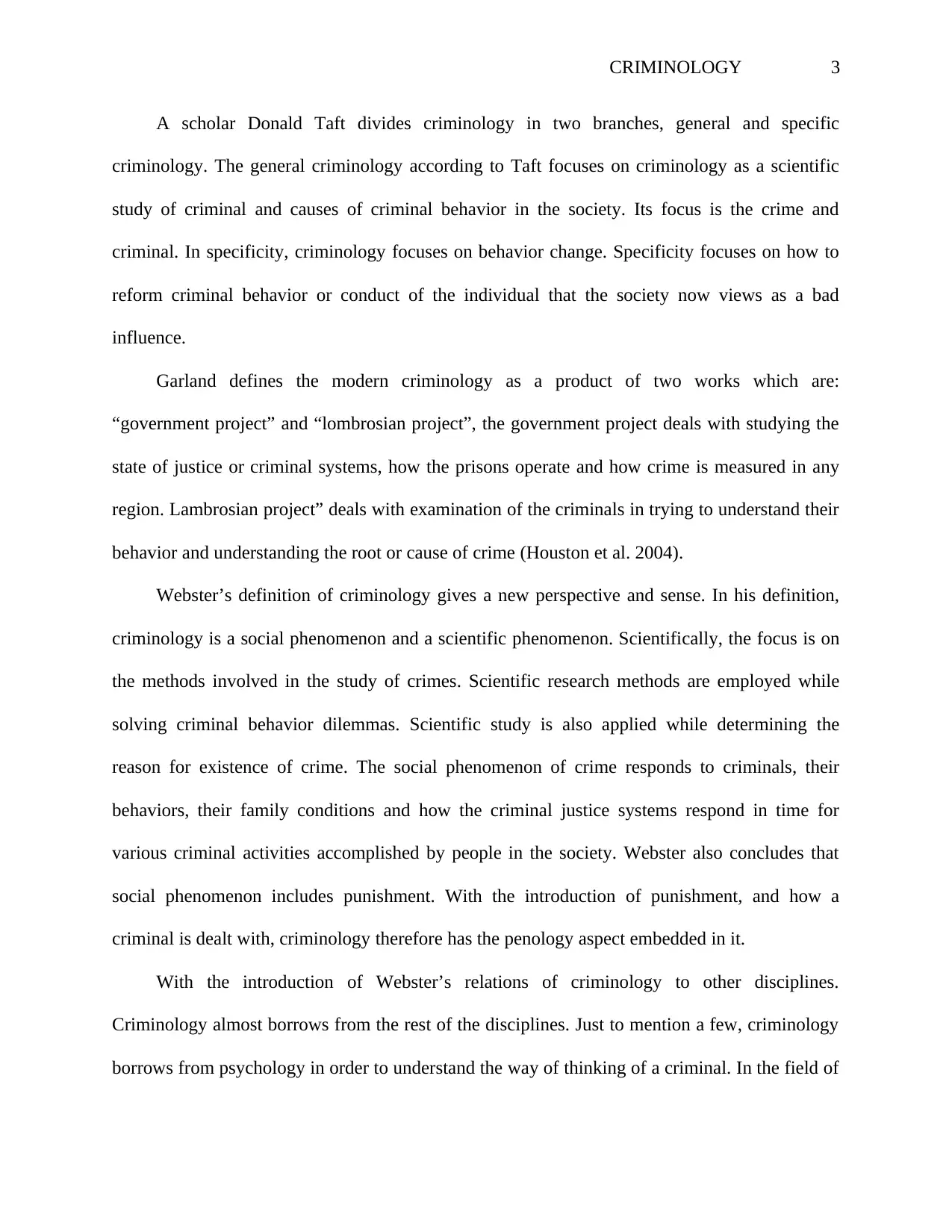
CRIMINOLOGY 3
A scholar Donald Taft divides criminology in two branches, general and specific
criminology. The general criminology according to Taft focuses on criminology as a scientific
study of criminal and causes of criminal behavior in the society. Its focus is the crime and
criminal. In specificity, criminology focuses on behavior change. Specificity focuses on how to
reform criminal behavior or conduct of the individual that the society now views as a bad
influence.
Garland defines the modern criminology as a product of two works which are:
“government project” and “lombrosian project”, the government project deals with studying the
state of justice or criminal systems, how the prisons operate and how crime is measured in any
region. Lambrosian project” deals with examination of the criminals in trying to understand their
behavior and understanding the root or cause of crime (Houston et al. 2004).
Webster’s definition of criminology gives a new perspective and sense. In his definition,
criminology is a social phenomenon and a scientific phenomenon. Scientifically, the focus is on
the methods involved in the study of crimes. Scientific research methods are employed while
solving criminal behavior dilemmas. Scientific study is also applied while determining the
reason for existence of crime. The social phenomenon of crime responds to criminals, their
behaviors, their family conditions and how the criminal justice systems respond in time for
various criminal activities accomplished by people in the society. Webster also concludes that
social phenomenon includes punishment. With the introduction of punishment, and how a
criminal is dealt with, criminology therefore has the penology aspect embedded in it.
With the introduction of Webster’s relations of criminology to other disciplines.
Criminology almost borrows from the rest of the disciplines. Just to mention a few, criminology
borrows from psychology in order to understand the way of thinking of a criminal. In the field of
A scholar Donald Taft divides criminology in two branches, general and specific
criminology. The general criminology according to Taft focuses on criminology as a scientific
study of criminal and causes of criminal behavior in the society. Its focus is the crime and
criminal. In specificity, criminology focuses on behavior change. Specificity focuses on how to
reform criminal behavior or conduct of the individual that the society now views as a bad
influence.
Garland defines the modern criminology as a product of two works which are:
“government project” and “lombrosian project”, the government project deals with studying the
state of justice or criminal systems, how the prisons operate and how crime is measured in any
region. Lambrosian project” deals with examination of the criminals in trying to understand their
behavior and understanding the root or cause of crime (Houston et al. 2004).
Webster’s definition of criminology gives a new perspective and sense. In his definition,
criminology is a social phenomenon and a scientific phenomenon. Scientifically, the focus is on
the methods involved in the study of crimes. Scientific research methods are employed while
solving criminal behavior dilemmas. Scientific study is also applied while determining the
reason for existence of crime. The social phenomenon of crime responds to criminals, their
behaviors, their family conditions and how the criminal justice systems respond in time for
various criminal activities accomplished by people in the society. Webster also concludes that
social phenomenon includes punishment. With the introduction of punishment, and how a
criminal is dealt with, criminology therefore has the penology aspect embedded in it.
With the introduction of Webster’s relations of criminology to other disciplines.
Criminology almost borrows from the rest of the disciplines. Just to mention a few, criminology
borrows from psychology in order to understand the way of thinking of a criminal. In the field of
⊘ This is a preview!⊘
Do you want full access?
Subscribe today to unlock all pages.

Trusted by 1+ million students worldwide
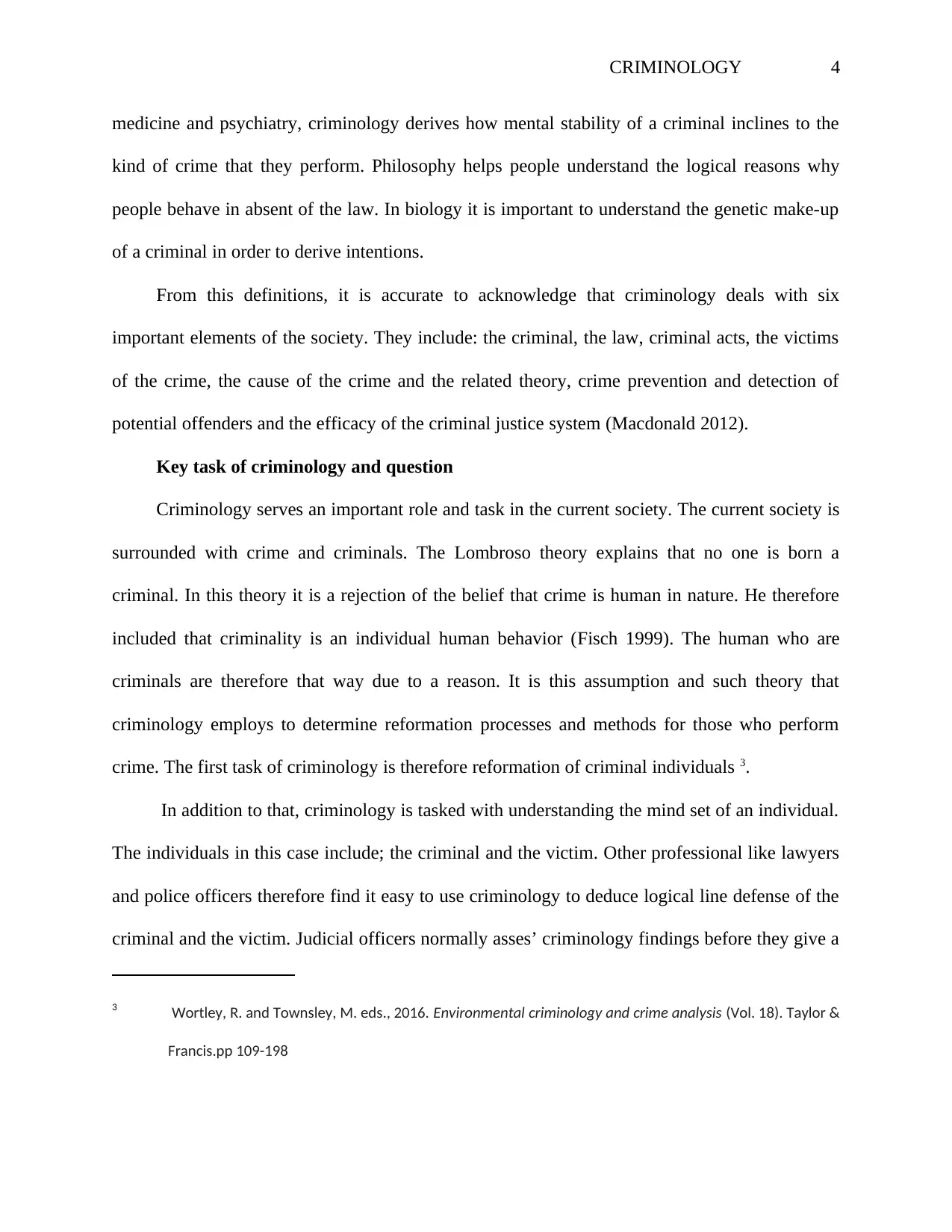
CRIMINOLOGY 4
medicine and psychiatry, criminology derives how mental stability of a criminal inclines to the
kind of crime that they perform. Philosophy helps people understand the logical reasons why
people behave in absent of the law. In biology it is important to understand the genetic make-up
of a criminal in order to derive intentions.
From this definitions, it is accurate to acknowledge that criminology deals with six
important elements of the society. They include: the criminal, the law, criminal acts, the victims
of the crime, the cause of the crime and the related theory, crime prevention and detection of
potential offenders and the efficacy of the criminal justice system (Macdonald 2012).
Key task of criminology and question
Criminology serves an important role and task in the current society. The current society is
surrounded with crime and criminals. The Lombroso theory explains that no one is born a
criminal. In this theory it is a rejection of the belief that crime is human in nature. He therefore
included that criminality is an individual human behavior (Fisch 1999). The human who are
criminals are therefore that way due to a reason. It is this assumption and such theory that
criminology employs to determine reformation processes and methods for those who perform
crime. The first task of criminology is therefore reformation of criminal individuals 3.
In addition to that, criminology is tasked with understanding the mind set of an individual.
The individuals in this case include; the criminal and the victim. Other professional like lawyers
and police officers therefore find it easy to use criminology to deduce logical line defense of the
criminal and the victim. Judicial officers normally asses’ criminology findings before they give a
3 Wortley, R. and Townsley, M. eds., 2016. Environmental criminology and crime analysis (Vol. 18). Taylor &
Francis.pp 109-198
medicine and psychiatry, criminology derives how mental stability of a criminal inclines to the
kind of crime that they perform. Philosophy helps people understand the logical reasons why
people behave in absent of the law. In biology it is important to understand the genetic make-up
of a criminal in order to derive intentions.
From this definitions, it is accurate to acknowledge that criminology deals with six
important elements of the society. They include: the criminal, the law, criminal acts, the victims
of the crime, the cause of the crime and the related theory, crime prevention and detection of
potential offenders and the efficacy of the criminal justice system (Macdonald 2012).
Key task of criminology and question
Criminology serves an important role and task in the current society. The current society is
surrounded with crime and criminals. The Lombroso theory explains that no one is born a
criminal. In this theory it is a rejection of the belief that crime is human in nature. He therefore
included that criminality is an individual human behavior (Fisch 1999). The human who are
criminals are therefore that way due to a reason. It is this assumption and such theory that
criminology employs to determine reformation processes and methods for those who perform
crime. The first task of criminology is therefore reformation of criminal individuals 3.
In addition to that, criminology is tasked with understanding the mind set of an individual.
The individuals in this case include; the criminal and the victim. Other professional like lawyers
and police officers therefore find it easy to use criminology to deduce logical line defense of the
criminal and the victim. Judicial officers normally asses’ criminology findings before they give a
3 Wortley, R. and Townsley, M. eds., 2016. Environmental criminology and crime analysis (Vol. 18). Taylor &
Francis.pp 109-198
Paraphrase This Document
Need a fresh take? Get an instant paraphrase of this document with our AI Paraphraser
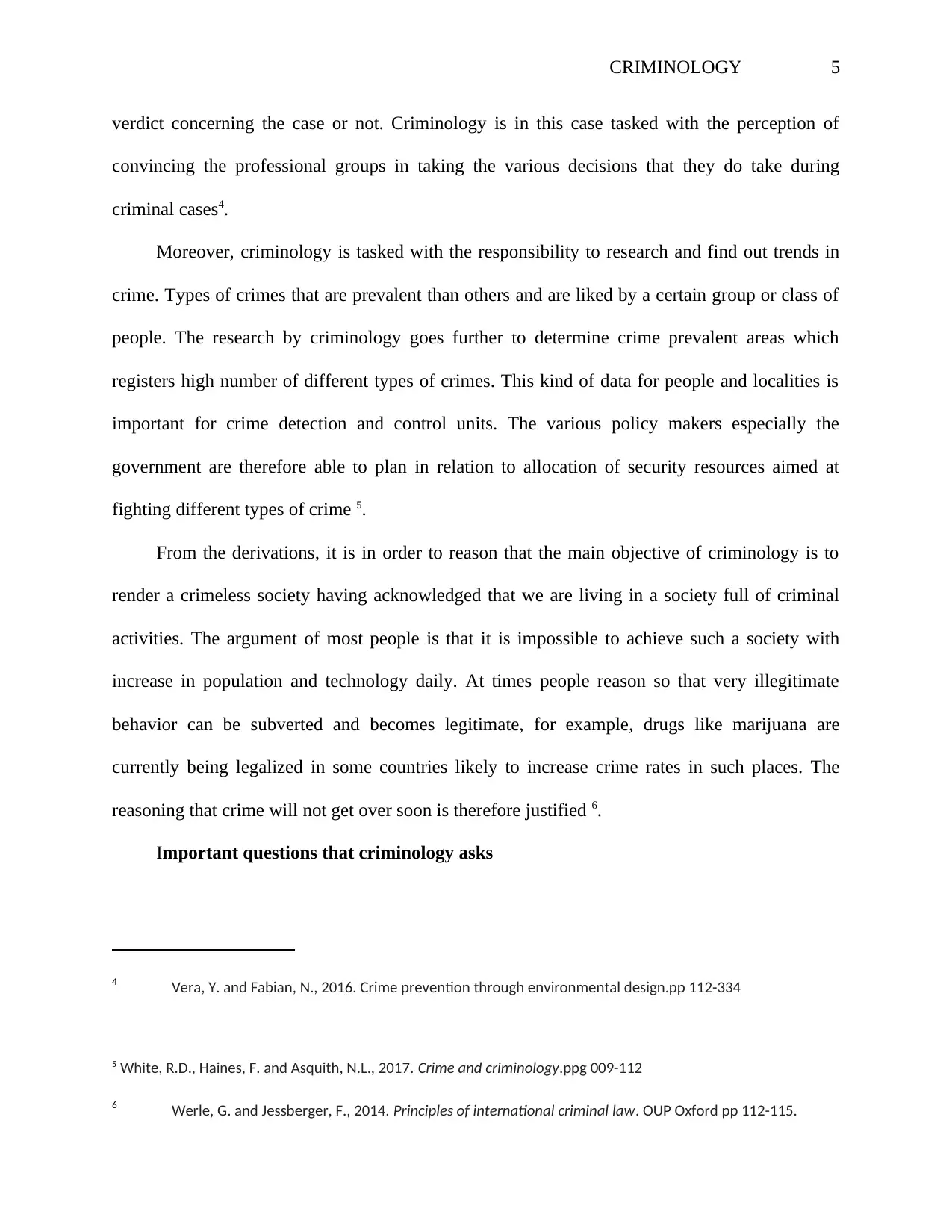
CRIMINOLOGY 5
verdict concerning the case or not. Criminology is in this case tasked with the perception of
convincing the professional groups in taking the various decisions that they do take during
criminal cases4.
Moreover, criminology is tasked with the responsibility to research and find out trends in
crime. Types of crimes that are prevalent than others and are liked by a certain group or class of
people. The research by criminology goes further to determine crime prevalent areas which
registers high number of different types of crimes. This kind of data for people and localities is
important for crime detection and control units. The various policy makers especially the
government are therefore able to plan in relation to allocation of security resources aimed at
fighting different types of crime 5.
From the derivations, it is in order to reason that the main objective of criminology is to
render a crimeless society having acknowledged that we are living in a society full of criminal
activities. The argument of most people is that it is impossible to achieve such a society with
increase in population and technology daily. At times people reason so that very illegitimate
behavior can be subverted and becomes legitimate, for example, drugs like marijuana are
currently being legalized in some countries likely to increase crime rates in such places. The
reasoning that crime will not get over soon is therefore justified 6.
Important questions that criminology asks
4 Vera, Y. and Fabian, N., 2016. Crime prevention through environmental design.pp 112-334
5 White, R.D., Haines, F. and Asquith, N.L., 2017. Crime and criminology.ppg 009-112
6 Werle, G. and Jessberger, F., 2014. Principles of international criminal law. OUP Oxford pp 112-115.
verdict concerning the case or not. Criminology is in this case tasked with the perception of
convincing the professional groups in taking the various decisions that they do take during
criminal cases4.
Moreover, criminology is tasked with the responsibility to research and find out trends in
crime. Types of crimes that are prevalent than others and are liked by a certain group or class of
people. The research by criminology goes further to determine crime prevalent areas which
registers high number of different types of crimes. This kind of data for people and localities is
important for crime detection and control units. The various policy makers especially the
government are therefore able to plan in relation to allocation of security resources aimed at
fighting different types of crime 5.
From the derivations, it is in order to reason that the main objective of criminology is to
render a crimeless society having acknowledged that we are living in a society full of criminal
activities. The argument of most people is that it is impossible to achieve such a society with
increase in population and technology daily. At times people reason so that very illegitimate
behavior can be subverted and becomes legitimate, for example, drugs like marijuana are
currently being legalized in some countries likely to increase crime rates in such places. The
reasoning that crime will not get over soon is therefore justified 6.
Important questions that criminology asks
4 Vera, Y. and Fabian, N., 2016. Crime prevention through environmental design.pp 112-334
5 White, R.D., Haines, F. and Asquith, N.L., 2017. Crime and criminology.ppg 009-112
6 Werle, G. and Jessberger, F., 2014. Principles of international criminal law. OUP Oxford pp 112-115.
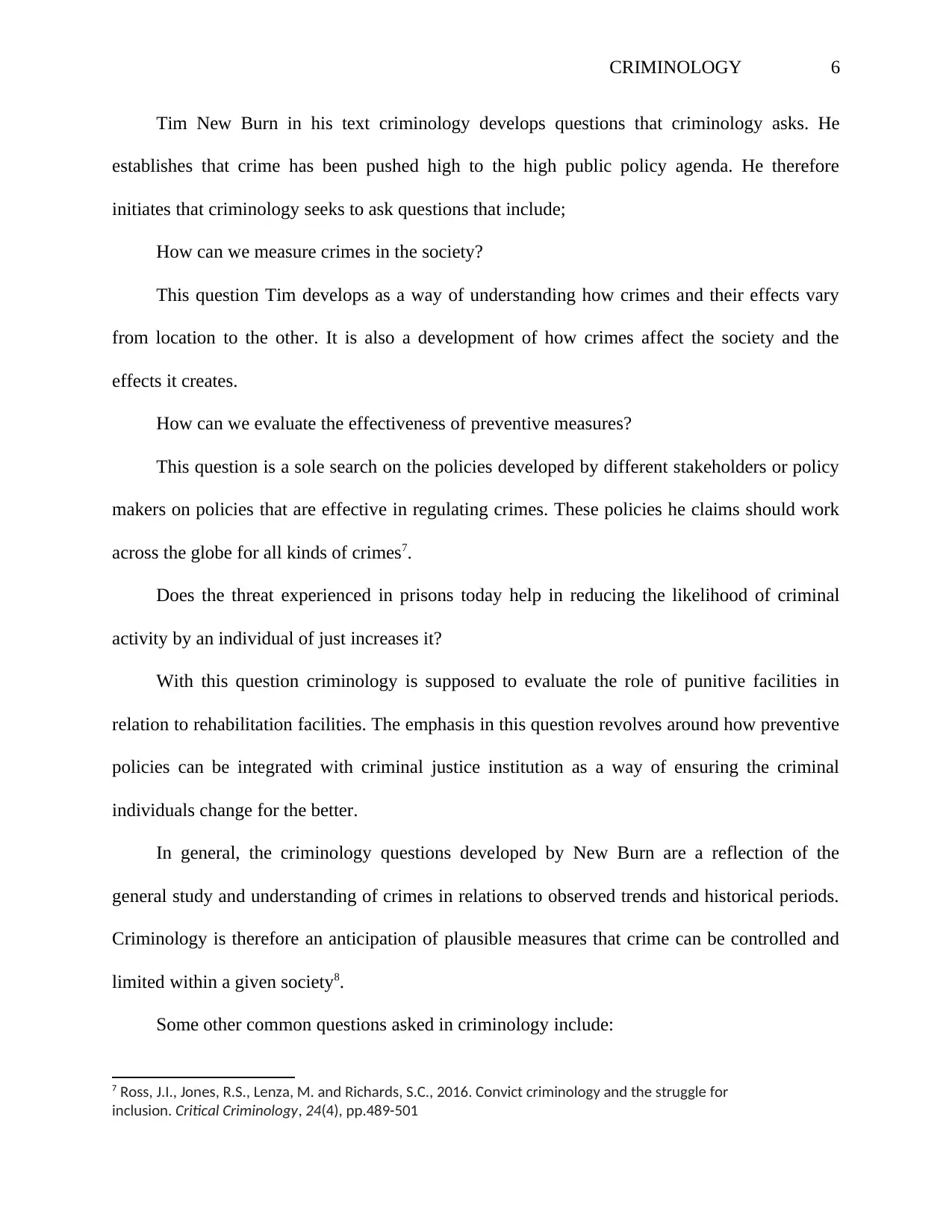
CRIMINOLOGY 6
Tim New Burn in his text criminology develops questions that criminology asks. He
establishes that crime has been pushed high to the high public policy agenda. He therefore
initiates that criminology seeks to ask questions that include;
How can we measure crimes in the society?
This question Tim develops as a way of understanding how crimes and their effects vary
from location to the other. It is also a development of how crimes affect the society and the
effects it creates.
How can we evaluate the effectiveness of preventive measures?
This question is a sole search on the policies developed by different stakeholders or policy
makers on policies that are effective in regulating crimes. These policies he claims should work
across the globe for all kinds of crimes7.
Does the threat experienced in prisons today help in reducing the likelihood of criminal
activity by an individual of just increases it?
With this question criminology is supposed to evaluate the role of punitive facilities in
relation to rehabilitation facilities. The emphasis in this question revolves around how preventive
policies can be integrated with criminal justice institution as a way of ensuring the criminal
individuals change for the better.
In general, the criminology questions developed by New Burn are a reflection of the
general study and understanding of crimes in relations to observed trends and historical periods.
Criminology is therefore an anticipation of plausible measures that crime can be controlled and
limited within a given society8.
Some other common questions asked in criminology include:
7 Ross, J.I., Jones, R.S., Lenza, M. and Richards, S.C., 2016. Convict criminology and the struggle for
inclusion. Critical Criminology, 24(4), pp.489-501
Tim New Burn in his text criminology develops questions that criminology asks. He
establishes that crime has been pushed high to the high public policy agenda. He therefore
initiates that criminology seeks to ask questions that include;
How can we measure crimes in the society?
This question Tim develops as a way of understanding how crimes and their effects vary
from location to the other. It is also a development of how crimes affect the society and the
effects it creates.
How can we evaluate the effectiveness of preventive measures?
This question is a sole search on the policies developed by different stakeholders or policy
makers on policies that are effective in regulating crimes. These policies he claims should work
across the globe for all kinds of crimes7.
Does the threat experienced in prisons today help in reducing the likelihood of criminal
activity by an individual of just increases it?
With this question criminology is supposed to evaluate the role of punitive facilities in
relation to rehabilitation facilities. The emphasis in this question revolves around how preventive
policies can be integrated with criminal justice institution as a way of ensuring the criminal
individuals change for the better.
In general, the criminology questions developed by New Burn are a reflection of the
general study and understanding of crimes in relations to observed trends and historical periods.
Criminology is therefore an anticipation of plausible measures that crime can be controlled and
limited within a given society8.
Some other common questions asked in criminology include:
7 Ross, J.I., Jones, R.S., Lenza, M. and Richards, S.C., 2016. Convict criminology and the struggle for
inclusion. Critical Criminology, 24(4), pp.489-501
⊘ This is a preview!⊘
Do you want full access?
Subscribe today to unlock all pages.

Trusted by 1+ million students worldwide
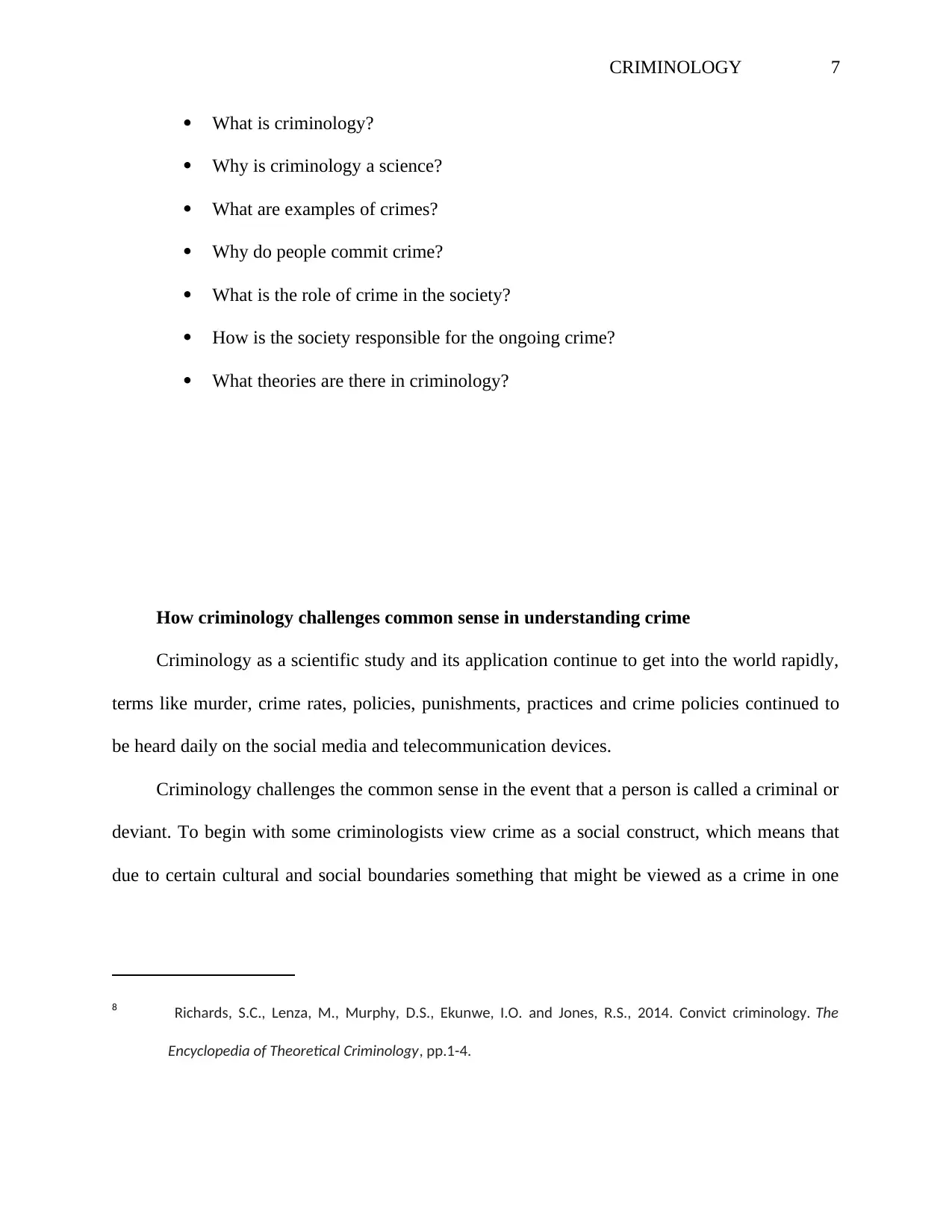
CRIMINOLOGY 7
What is criminology?
Why is criminology a science?
What are examples of crimes?
Why do people commit crime?
What is the role of crime in the society?
How is the society responsible for the ongoing crime?
What theories are there in criminology?
How criminology challenges common sense in understanding crime
Criminology as a scientific study and its application continue to get into the world rapidly,
terms like murder, crime rates, policies, punishments, practices and crime policies continued to
be heard daily on the social media and telecommunication devices.
Criminology challenges the common sense in the event that a person is called a criminal or
deviant. To begin with some criminologists view crime as a social construct, which means that
due to certain cultural and social boundaries something that might be viewed as a crime in one
8 Richards, S.C., Lenza, M., Murphy, D.S., Ekunwe, I.O. and Jones, R.S., 2014. Convict criminology. The
Encyclopedia of Theoretical Criminology, pp.1-4.
What is criminology?
Why is criminology a science?
What are examples of crimes?
Why do people commit crime?
What is the role of crime in the society?
How is the society responsible for the ongoing crime?
What theories are there in criminology?
How criminology challenges common sense in understanding crime
Criminology as a scientific study and its application continue to get into the world rapidly,
terms like murder, crime rates, policies, punishments, practices and crime policies continued to
be heard daily on the social media and telecommunication devices.
Criminology challenges the common sense in the event that a person is called a criminal or
deviant. To begin with some criminologists view crime as a social construct, which means that
due to certain cultural and social boundaries something that might be viewed as a crime in one
8 Richards, S.C., Lenza, M., Murphy, D.S., Ekunwe, I.O. and Jones, R.S., 2014. Convict criminology. The
Encyclopedia of Theoretical Criminology, pp.1-4.
Paraphrase This Document
Need a fresh take? Get an instant paraphrase of this document with our AI Paraphraser
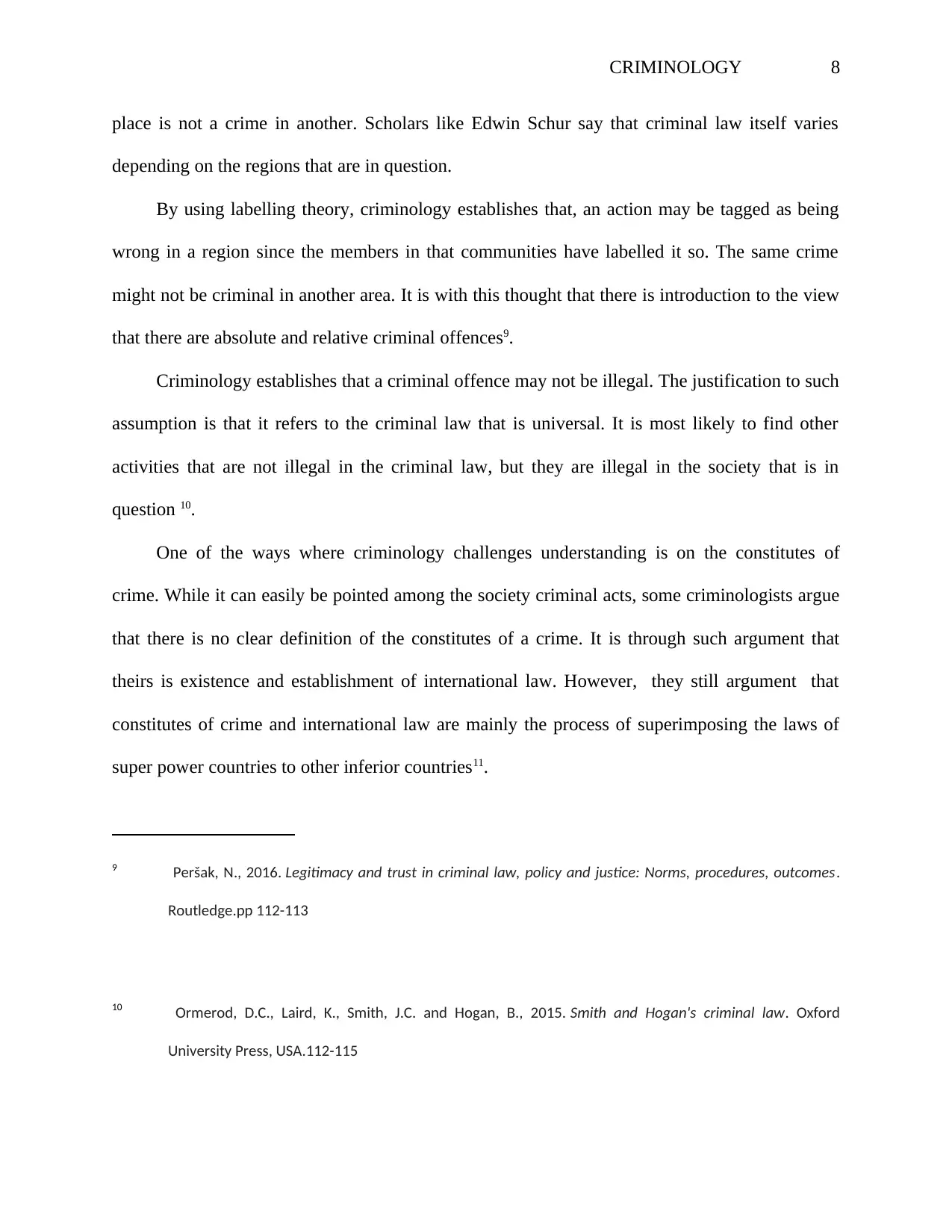
CRIMINOLOGY 8
place is not a crime in another. Scholars like Edwin Schur say that criminal law itself varies
depending on the regions that are in question.
By using labelling theory, criminology establishes that, an action may be tagged as being
wrong in a region since the members in that communities have labelled it so. The same crime
might not be criminal in another area. It is with this thought that there is introduction to the view
that there are absolute and relative criminal offences9.
Criminology establishes that a criminal offence may not be illegal. The justification to such
assumption is that it refers to the criminal law that is universal. It is most likely to find other
activities that are not illegal in the criminal law, but they are illegal in the society that is in
question 10.
One of the ways where criminology challenges understanding is on the constitutes of
crime. While it can easily be pointed among the society criminal acts, some criminologists argue
that there is no clear definition of the constitutes of a crime. It is through such argument that
theirs is existence and establishment of international law. However, they still argument that
constitutes of crime and international law are mainly the process of superimposing the laws of
super power countries to other inferior countries11.
9 Peršak, N., 2016. Legitimacy and trust in criminal law, policy and justice: Norms, procedures, outcomes.
Routledge.pp 112-113
10 Ormerod, D.C., Laird, K., Smith, J.C. and Hogan, B., 2015. Smith and Hogan's criminal law. Oxford
University Press, USA.112-115
place is not a crime in another. Scholars like Edwin Schur say that criminal law itself varies
depending on the regions that are in question.
By using labelling theory, criminology establishes that, an action may be tagged as being
wrong in a region since the members in that communities have labelled it so. The same crime
might not be criminal in another area. It is with this thought that there is introduction to the view
that there are absolute and relative criminal offences9.
Criminology establishes that a criminal offence may not be illegal. The justification to such
assumption is that it refers to the criminal law that is universal. It is most likely to find other
activities that are not illegal in the criminal law, but they are illegal in the society that is in
question 10.
One of the ways where criminology challenges understanding is on the constitutes of
crime. While it can easily be pointed among the society criminal acts, some criminologists argue
that there is no clear definition of the constitutes of a crime. It is through such argument that
theirs is existence and establishment of international law. However, they still argument that
constitutes of crime and international law are mainly the process of superimposing the laws of
super power countries to other inferior countries11.
9 Peršak, N., 2016. Legitimacy and trust in criminal law, policy and justice: Norms, procedures, outcomes.
Routledge.pp 112-113
10 Ormerod, D.C., Laird, K., Smith, J.C. and Hogan, B., 2015. Smith and Hogan's criminal law. Oxford
University Press, USA.112-115
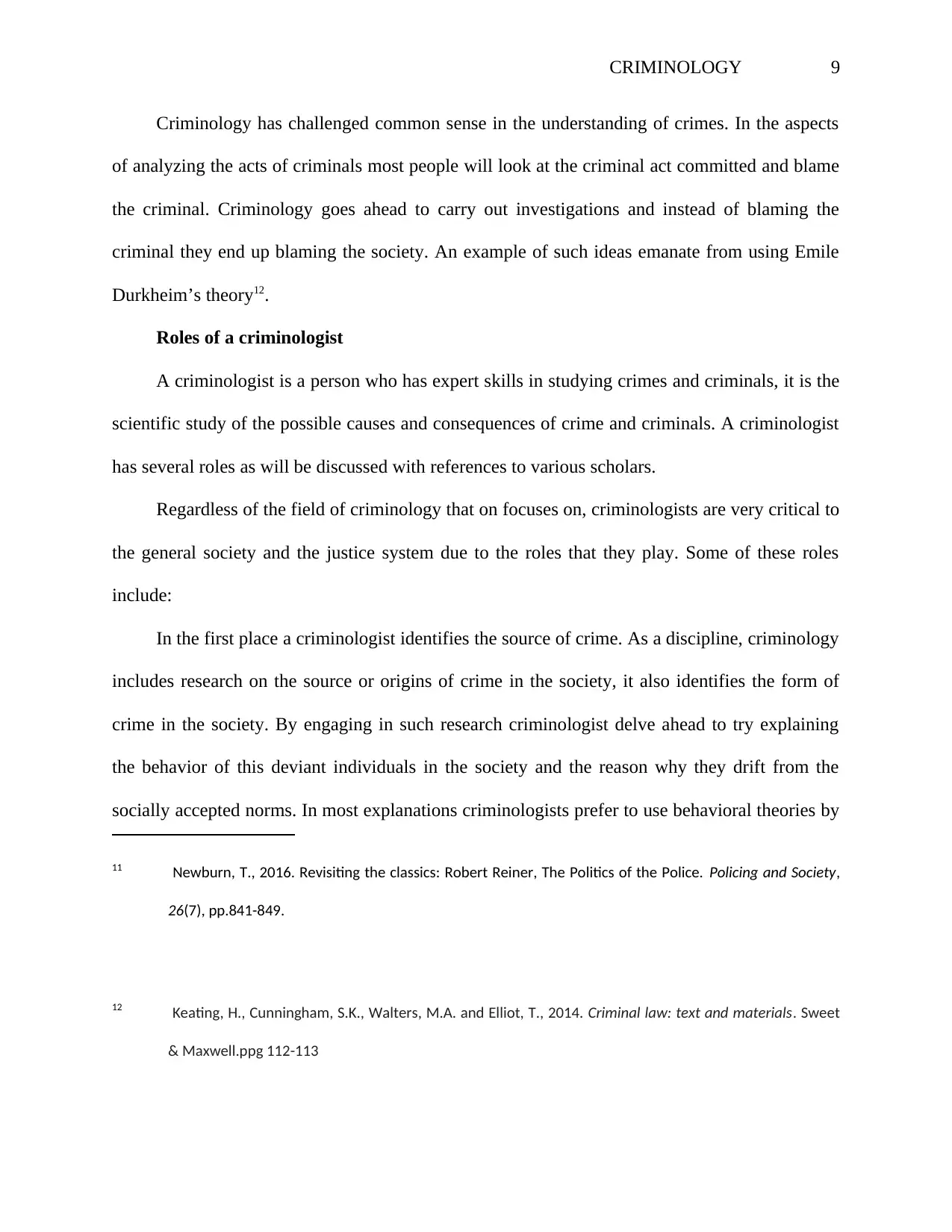
CRIMINOLOGY 9
Criminology has challenged common sense in the understanding of crimes. In the aspects
of analyzing the acts of criminals most people will look at the criminal act committed and blame
the criminal. Criminology goes ahead to carry out investigations and instead of blaming the
criminal they end up blaming the society. An example of such ideas emanate from using Emile
Durkheim’s theory12.
Roles of a criminologist
A criminologist is a person who has expert skills in studying crimes and criminals, it is the
scientific study of the possible causes and consequences of crime and criminals. A criminologist
has several roles as will be discussed with references to various scholars.
Regardless of the field of criminology that on focuses on, criminologists are very critical to
the general society and the justice system due to the roles that they play. Some of these roles
include:
In the first place a criminologist identifies the source of crime. As a discipline, criminology
includes research on the source or origins of crime in the society, it also identifies the form of
crime in the society. By engaging in such research criminologist delve ahead to try explaining
the behavior of this deviant individuals in the society and the reason why they drift from the
socially accepted norms. In most explanations criminologists prefer to use behavioral theories by
11 Newburn, T., 2016. Revisiting the classics: Robert Reiner, The Politics of the Police. Policing and Society,
26(7), pp.841-849.
12 Keating, H., Cunningham, S.K., Walters, M.A. and Elliot, T., 2014. Criminal law: text and materials. Sweet
& Maxwell.ppg 112-113
Criminology has challenged common sense in the understanding of crimes. In the aspects
of analyzing the acts of criminals most people will look at the criminal act committed and blame
the criminal. Criminology goes ahead to carry out investigations and instead of blaming the
criminal they end up blaming the society. An example of such ideas emanate from using Emile
Durkheim’s theory12.
Roles of a criminologist
A criminologist is a person who has expert skills in studying crimes and criminals, it is the
scientific study of the possible causes and consequences of crime and criminals. A criminologist
has several roles as will be discussed with references to various scholars.
Regardless of the field of criminology that on focuses on, criminologists are very critical to
the general society and the justice system due to the roles that they play. Some of these roles
include:
In the first place a criminologist identifies the source of crime. As a discipline, criminology
includes research on the source or origins of crime in the society, it also identifies the form of
crime in the society. By engaging in such research criminologist delve ahead to try explaining
the behavior of this deviant individuals in the society and the reason why they drift from the
socially accepted norms. In most explanations criminologists prefer to use behavioral theories by
11 Newburn, T., 2016. Revisiting the classics: Robert Reiner, The Politics of the Police. Policing and Society,
26(7), pp.841-849.
12 Keating, H., Cunningham, S.K., Walters, M.A. and Elliot, T., 2014. Criminal law: text and materials. Sweet
& Maxwell.ppg 112-113
⊘ This is a preview!⊘
Do you want full access?
Subscribe today to unlock all pages.

Trusted by 1+ million students worldwide
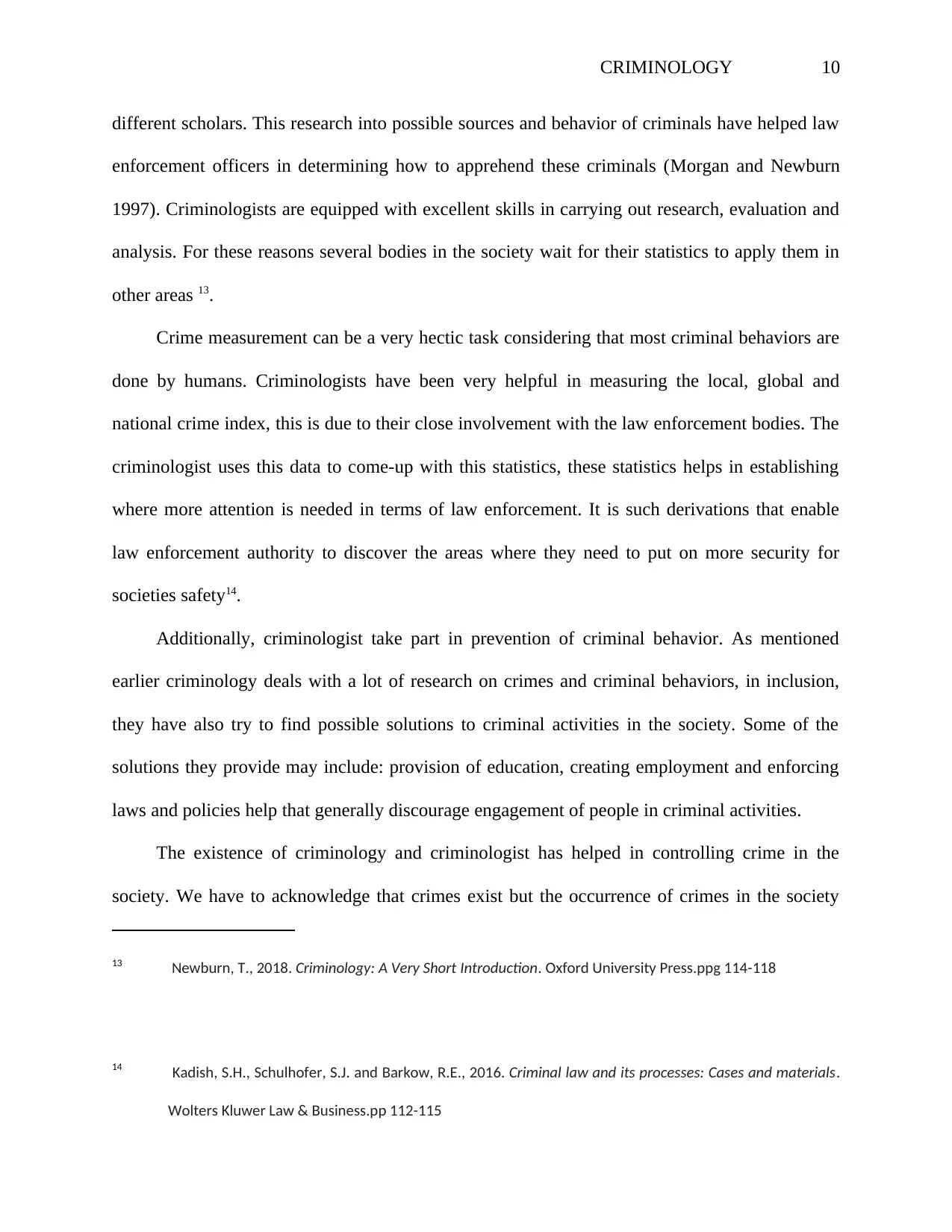
CRIMINOLOGY 10
different scholars. This research into possible sources and behavior of criminals have helped law
enforcement officers in determining how to apprehend these criminals (Morgan and Newburn
1997). Criminologists are equipped with excellent skills in carrying out research, evaluation and
analysis. For these reasons several bodies in the society wait for their statistics to apply them in
other areas 13.
Crime measurement can be a very hectic task considering that most criminal behaviors are
done by humans. Criminologists have been very helpful in measuring the local, global and
national crime index, this is due to their close involvement with the law enforcement bodies. The
criminologist uses this data to come-up with this statistics, these statistics helps in establishing
where more attention is needed in terms of law enforcement. It is such derivations that enable
law enforcement authority to discover the areas where they need to put on more security for
societies safety14.
Additionally, criminologist take part in prevention of criminal behavior. As mentioned
earlier criminology deals with a lot of research on crimes and criminal behaviors, in inclusion,
they have also try to find possible solutions to criminal activities in the society. Some of the
solutions they provide may include: provision of education, creating employment and enforcing
laws and policies help that generally discourage engagement of people in criminal activities.
The existence of criminology and criminologist has helped in controlling crime in the
society. We have to acknowledge that crimes exist but the occurrence of crimes in the society
13 Newburn, T., 2018. Criminology: A Very Short Introduction. Oxford University Press.ppg 114-118
14 Kadish, S.H., Schulhofer, S.J. and Barkow, R.E., 2016. Criminal law and its processes: Cases and materials.
Wolters Kluwer Law & Business.pp 112-115
different scholars. This research into possible sources and behavior of criminals have helped law
enforcement officers in determining how to apprehend these criminals (Morgan and Newburn
1997). Criminologists are equipped with excellent skills in carrying out research, evaluation and
analysis. For these reasons several bodies in the society wait for their statistics to apply them in
other areas 13.
Crime measurement can be a very hectic task considering that most criminal behaviors are
done by humans. Criminologists have been very helpful in measuring the local, global and
national crime index, this is due to their close involvement with the law enforcement bodies. The
criminologist uses this data to come-up with this statistics, these statistics helps in establishing
where more attention is needed in terms of law enforcement. It is such derivations that enable
law enforcement authority to discover the areas where they need to put on more security for
societies safety14.
Additionally, criminologist take part in prevention of criminal behavior. As mentioned
earlier criminology deals with a lot of research on crimes and criminal behaviors, in inclusion,
they have also try to find possible solutions to criminal activities in the society. Some of the
solutions they provide may include: provision of education, creating employment and enforcing
laws and policies help that generally discourage engagement of people in criminal activities.
The existence of criminology and criminologist has helped in controlling crime in the
society. We have to acknowledge that crimes exist but the occurrence of crimes in the society
13 Newburn, T., 2018. Criminology: A Very Short Introduction. Oxford University Press.ppg 114-118
14 Kadish, S.H., Schulhofer, S.J. and Barkow, R.E., 2016. Criminal law and its processes: Cases and materials.
Wolters Kluwer Law & Business.pp 112-115
Paraphrase This Document
Need a fresh take? Get an instant paraphrase of this document with our AI Paraphraser
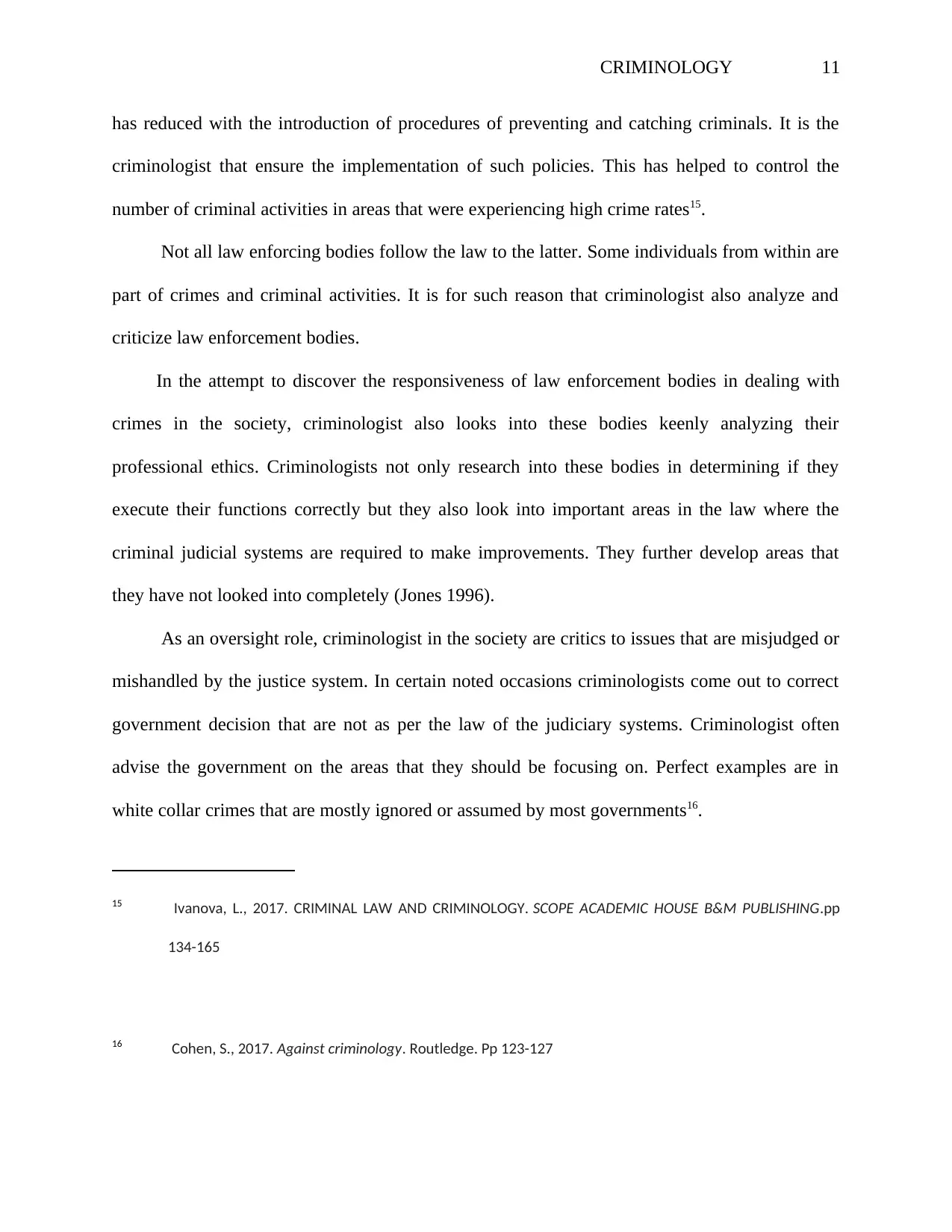
CRIMINOLOGY 11
has reduced with the introduction of procedures of preventing and catching criminals. It is the
criminologist that ensure the implementation of such policies. This has helped to control the
number of criminal activities in areas that were experiencing high crime rates15.
Not all law enforcing bodies follow the law to the latter. Some individuals from within are
part of crimes and criminal activities. It is for such reason that criminologist also analyze and
criticize law enforcement bodies.
In the attempt to discover the responsiveness of law enforcement bodies in dealing with
crimes in the society, criminologist also looks into these bodies keenly analyzing their
professional ethics. Criminologists not only research into these bodies in determining if they
execute their functions correctly but they also look into important areas in the law where the
criminal judicial systems are required to make improvements. They further develop areas that
they have not looked into completely (Jones 1996).
As an oversight role, criminologist in the society are critics to issues that are misjudged or
mishandled by the justice system. In certain noted occasions criminologists come out to correct
government decision that are not as per the law of the judiciary systems. Criminologist often
advise the government on the areas that they should be focusing on. Perfect examples are in
white collar crimes that are mostly ignored or assumed by most governments16.
15 Ivanova, L., 2017. CRIMINAL LAW AND CRIMINOLOGY. SCOPE ACADEMIC HOUSE B&M PUBLISHING.pp
134-165
16 Cohen, S., 2017. Against criminology. Routledge. Pp 123-127
has reduced with the introduction of procedures of preventing and catching criminals. It is the
criminologist that ensure the implementation of such policies. This has helped to control the
number of criminal activities in areas that were experiencing high crime rates15.
Not all law enforcing bodies follow the law to the latter. Some individuals from within are
part of crimes and criminal activities. It is for such reason that criminologist also analyze and
criticize law enforcement bodies.
In the attempt to discover the responsiveness of law enforcement bodies in dealing with
crimes in the society, criminologist also looks into these bodies keenly analyzing their
professional ethics. Criminologists not only research into these bodies in determining if they
execute their functions correctly but they also look into important areas in the law where the
criminal judicial systems are required to make improvements. They further develop areas that
they have not looked into completely (Jones 1996).
As an oversight role, criminologist in the society are critics to issues that are misjudged or
mishandled by the justice system. In certain noted occasions criminologists come out to correct
government decision that are not as per the law of the judiciary systems. Criminologist often
advise the government on the areas that they should be focusing on. Perfect examples are in
white collar crimes that are mostly ignored or assumed by most governments16.
15 Ivanova, L., 2017. CRIMINAL LAW AND CRIMINOLOGY. SCOPE ACADEMIC HOUSE B&M PUBLISHING.pp
134-165
16 Cohen, S., 2017. Against criminology. Routledge. Pp 123-127
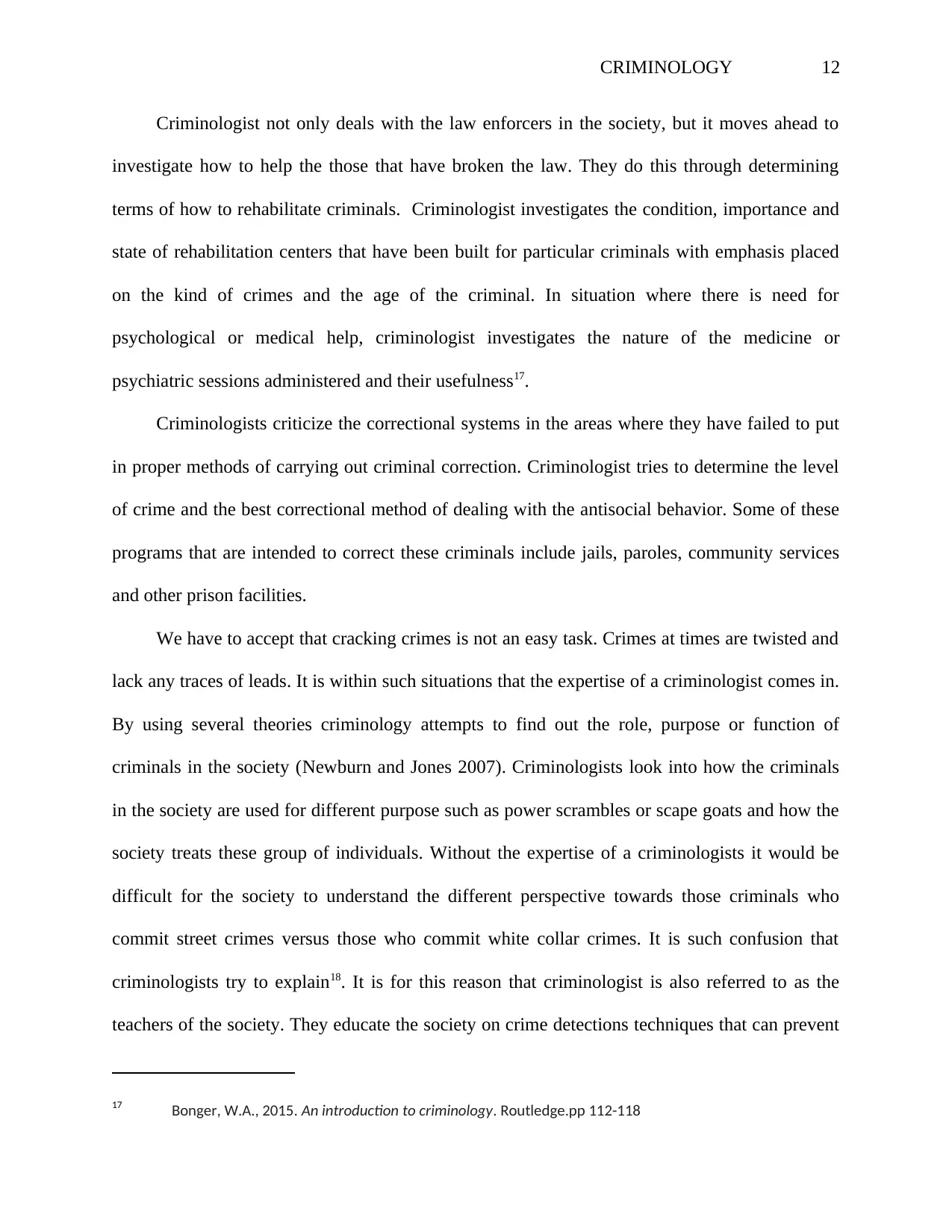
CRIMINOLOGY 12
Criminologist not only deals with the law enforcers in the society, but it moves ahead to
investigate how to help the those that have broken the law. They do this through determining
terms of how to rehabilitate criminals. Criminologist investigates the condition, importance and
state of rehabilitation centers that have been built for particular criminals with emphasis placed
on the kind of crimes and the age of the criminal. In situation where there is need for
psychological or medical help, criminologist investigates the nature of the medicine or
psychiatric sessions administered and their usefulness17.
Criminologists criticize the correctional systems in the areas where they have failed to put
in proper methods of carrying out criminal correction. Criminologist tries to determine the level
of crime and the best correctional method of dealing with the antisocial behavior. Some of these
programs that are intended to correct these criminals include jails, paroles, community services
and other prison facilities.
We have to accept that cracking crimes is not an easy task. Crimes at times are twisted and
lack any traces of leads. It is within such situations that the expertise of a criminologist comes in.
By using several theories criminology attempts to find out the role, purpose or function of
criminals in the society (Newburn and Jones 2007). Criminologists look into how the criminals
in the society are used for different purpose such as power scrambles or scape goats and how the
society treats these group of individuals. Without the expertise of a criminologists it would be
difficult for the society to understand the different perspective towards those criminals who
commit street crimes versus those who commit white collar crimes. It is such confusion that
criminologists try to explain18. It is for this reason that criminologist is also referred to as the
teachers of the society. They educate the society on crime detections techniques that can prevent
17 Bonger, W.A., 2015. An introduction to criminology. Routledge.pp 112-118
Criminologist not only deals with the law enforcers in the society, but it moves ahead to
investigate how to help the those that have broken the law. They do this through determining
terms of how to rehabilitate criminals. Criminologist investigates the condition, importance and
state of rehabilitation centers that have been built for particular criminals with emphasis placed
on the kind of crimes and the age of the criminal. In situation where there is need for
psychological or medical help, criminologist investigates the nature of the medicine or
psychiatric sessions administered and their usefulness17.
Criminologists criticize the correctional systems in the areas where they have failed to put
in proper methods of carrying out criminal correction. Criminologist tries to determine the level
of crime and the best correctional method of dealing with the antisocial behavior. Some of these
programs that are intended to correct these criminals include jails, paroles, community services
and other prison facilities.
We have to accept that cracking crimes is not an easy task. Crimes at times are twisted and
lack any traces of leads. It is within such situations that the expertise of a criminologist comes in.
By using several theories criminology attempts to find out the role, purpose or function of
criminals in the society (Newburn and Jones 2007). Criminologists look into how the criminals
in the society are used for different purpose such as power scrambles or scape goats and how the
society treats these group of individuals. Without the expertise of a criminologists it would be
difficult for the society to understand the different perspective towards those criminals who
commit street crimes versus those who commit white collar crimes. It is such confusion that
criminologists try to explain18. It is for this reason that criminologist is also referred to as the
teachers of the society. They educate the society on crime detections techniques that can prevent
17 Bonger, W.A., 2015. An introduction to criminology. Routledge.pp 112-118
⊘ This is a preview!⊘
Do you want full access?
Subscribe today to unlock all pages.

Trusted by 1+ million students worldwide
1 out of 15
Related Documents
Your All-in-One AI-Powered Toolkit for Academic Success.
+13062052269
info@desklib.com
Available 24*7 on WhatsApp / Email
![[object Object]](/_next/static/media/star-bottom.7253800d.svg)
Unlock your academic potential
Copyright © 2020–2025 A2Z Services. All Rights Reserved. Developed and managed by ZUCOL.





